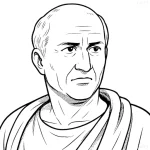“What then is freedom? The power to live as one wishes.”

- January 3, 106 BC – December 7, 43 BC
- Roman
- Orator, Philosopher, Statesman, Lawyer, Author
table of contents
Quote
“What then is freedom? The power to live as one wishes.”
Explanation
Cicero defines freedom as the ability to live according to one’s own will, a concise but profound expression of personal autonomy. This view centers on the idea that true liberty lies in self-direction, where an individual is not constrained by external force or arbitrary authority, but rather chooses their own course of life. The quote presents freedom as the condition of acting in alignment with one’s own values and desires.
However, in Cicero’s broader philosophy—shaped by Stoic and Roman republican ideals—this freedom was never meant to be license for indulgence or lawlessness. Instead, he emphasized that freedom must be grounded in reason, virtue, and respect for the law. To “live as one wishes” did not mean pursuing every whim, but rather living as one ought—guided by moral principles and the responsibilities of citizenship.
In the modern world, the quote resonates in debates over individual rights, civil liberties, and moral agency. While many define freedom as doing whatever one pleases, Cicero reminds us that true freedom is achieved when one’s will is aligned with justice and reason. It is a call to balance liberty with responsibility, and to ensure that freedom serves not just the self, but the common good.
Would you like to share your impressions or related stories about this quote in the comments section?

